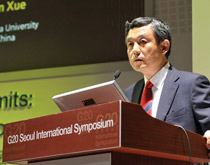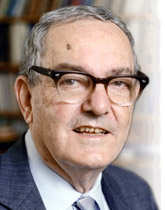A graduate student, laden with books, more than he had room for in his bag, walks down the slope of Baker Hall. Despite his burden, he's practically skipping. Like many before him, this student is coming from Herb Simon's office, and like the others, he's wiser than before the visit. Simon, a distinguished social scientist, always makes time for his students. Stepping into Simon's office, even running into him in the hallways, often prompts a spontaneous intellectual conversation—and a larger reading list, too. His love of teaching is as relevant to him, his assistants and former students swear, as receiving two of the world's most coveted honors: the Turing Award (with his Carnegie Mellon collaborator Allen Newell) and the Nobel Prize for Economics. Simon is known for even sitting in freshman dormitory halls and discussing decision theory, along with bringing to the classroom a new take on classic texts across a range of studies—social science, economics, artificial intelligence, decision theory—all fields where he has made huge impacts.

For the student who just left Simon's office, he will most remember the professor because of a simple gesture.
Lan Xue is 7,000 miles from his home in Beijing, China. He's lived in the United States for just two years. He has never visited Pittsburgh before and is only beginning to get comfortable with life in the States. Yet, there's a comforting feeling he gets at Carnegie Mellon, primarily from the presence of other Chinese students. As he puts it, "I think every Chinese student felt like they were a member of the Chinese Student Association." One evening, Simon jointed a dinner hosted by a Chinese visiting scholar who is also a member of the association. Simon chats freely with the students. Xue is more than a little impressed that this campus legend would take the time to join their gathering.
Academically, Xue is covering as much ground as he can, taking courses in engineering, business, and public policy. Among his professors is Granger Morgan, then head of the Department of Engineering and Public Policy. Morgan— who would become a world-renowned expert on climate change, serving, among his professional memberships, as chair of the EPA Science Advisory Board—helps encourage Xue's interest in the intersection of technology and public policy. Morgan also has a personal connection to his students—once a year, he invites them to his home for a picnic.
When Xue earns his PhD in engineering and public policy in 1991, he must leave behind the "nurturing professors" who, he says, did far more than just teach him in the classroom. He becomes a professor at George Washington University. While there, his paper on "the use of technology at small firms" appears in a journal Technovation: The International Journal of Technological Innovation, Entrepreneurship and Technology Management. Xue's academic career is on its way. But in 1996, he makes a life-altering decision; he will return to his homeland and teach at Tsinghua University in Beijing.
His friend and former classmate Jinhong Florig (E'89, '91) realizes the courage in that decision: "When he went back, there was some real uncertainty as to whether he could succeed; and he took a big salary cut." At the time, public policy education was just beginning in China, a burgeoning field in a burgeoning economy. The university's School of Public Policy and Management had yet to be established. In other words, it was, as Xue describes, like teaching courses in a country where the book on the subject hadn't even been written.
The return home didn't backfire. Xue has played a key role in building that university's Public Policy and Management School, and he is now the dean. He is also in demand among dozens of technology and innovation organizations internationally. As the program has grown in stature, so has the university—according to the most recent academic reputation ranking published by Times Higher Education's World University Rankings, Tsinghua University is number three in China (and 58th in the world).

Xue hasn't forgotten about Carnegie Mellon. In fact, for years he got together regularly with about a dozen alumni who lived nearby. They'd gather for dinner, cultural events, and particularly the annual Chinese New Year celebration.
It was those friends who called each other in 2001 when they heard the news: the beloved Herb Simon had passed away. The close-knit group gathered together in an impromptu meeting that very day at Tsinghua. They shared stories of how the late professor had helped with tough problems and tricky research questions. Xue says each knew Simon well and recounted a personal story. Although the group had met many times before, it was that night when Xue saw there was something more to gathering alumni than just to socialize: each alumnus, in remembering Simon, helped the others.
Xue began to think of a way to keep the Beijing Carnegie Mellon community closer together. "In a way, it was a natural progression," he says. What had started as a gathering of friends became a widespread, formal organization for Carnegie Mellon alumni living around Beijing. With the help of Kate Shen (CS'08), Xue now organizes regular alumni events—from a trip to hear the Pittsburgh Symphony perform in Beijing to a gathering of higher-education leaders in China that included Carnegie Mellon President Jared Cohon.
The Beijing alumni organization now has more than 400 members. After Xue's hectic workdays at Tsinghua, he says, spending time with others from his alma mater is a welcome respite, something he learned from Herb Simon.
Michelle Bova (HS'07), a freelance writer, has been a regular contributor to this magazine since her senior year at Carnegie Mellon.



